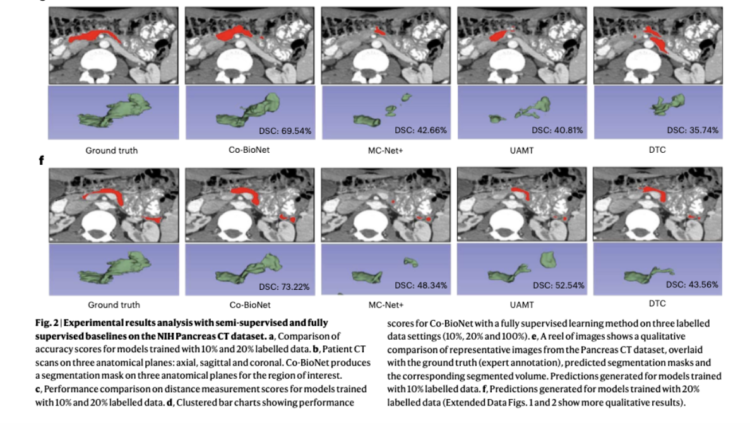Meet Co-BioNet: Monash University’s Adversarial AI System Revolutionizing Medical Image Analysis, Enhancing Accuracy Without Extensive Human Annotations
Deep learning has significantly advanced medical artificial intelligence. Still, it poses the challenge of requiring large amounts of annotated data for training, which can be laborious and prone to human biases, especially in image segmentation tasks. Researchers at Monash University recognized the limited availability of human-annotated medical images and, in response, proposed an innovative adversarial learning approach to address this issue. They aim to advance medical image analysis, benefiting radiologists and healthcare experts. The current reliance on manual human annotations is time-consuming, subjective, and error-prone, emphasizing the need for an alternative solution.
Traditionally, radiologists and other medical experts annotate medical scans by hand, highlighting specific areas of interest, such as tumors or other lesions. However, this method relies on the subjective interpretation of individuals, is time-consuming, and is prone to errors, especially when it comes to 3D medical modalities(for example, MRI CT), leading to extended waiting periods for patients seeking treatments. Furthermore, contouring anatomical structures(organs or tissues) in medical images requires tedious manual input because medical images usually have low-contrast slices with ambiguous regions.
The research team at Monash University developed a “dual-view” AI system to overcome the limitations of traditional medical image annotation techniques. This innovative approach involves two components competing against each other – one part emulates radiologists’ expertise by labeling medical images. In contrast, the other evaluates the quality of AI-generated labels by comparing them to limited annotated scans provided by human radiologists. By leveraging labeled and unlabeled data, the proposed AI algorithm enhances accuracy and achieves groundbreaking results in semi-supervised learning. Even with limited annotations, the AI models can make informed decisions, validate initial assessments, and produce more accurate diagnoses and treatment decisions. This advancement offers a promising alternative to extensive human annotations in medical image analysis.
In their novel AI algorithm, the researchers use critic networks to enable each view of the AI system to learn from the high-confidence predictions of the other theory. By incorporating uncertainty, the AI system can effectively measure the quality of its generated labels, enhancing the accuracy of medical image segmentation. To jointly learn the dual views and the critics, the researchers formulate the learning problem as a min-max optimization, leading to more robust and accurate segmentation.
In their experiments, the researchers compared the performance of their proposed method against state-of-the-art baselines. The evaluation was qualitative and quantitative, involving four public datasets with multiple modalities, such as computerized tomography(CT) and magnetic resonance imaging(MRI). The results demonstrated that the proposed semi-supervised method outperformed competing baselines while achieving competitive performance compared to fully supervised approaches. Across three publicly accessible medical datasets, utilizing just 10% labeled data resulted in an average improvement of 3% compared to the most recent state-of-the-art method under identical conditions. This result highlights the efficiency of the uncertainty-guided co-training framework in generating plausible segmentation masks, facilitating semi-automated segmentation processes, and advancing medical image analysis for radiologists and healthcare experts.
Proposed Architecture
The AI system Monash University’s research team developed represents a significant breakthrough in medical image analysis. By enabling AI models to make informed decisions and validate their assessments, it holds the potential to uncover more accurate diagnoses and treatment decisions. The team’s commitment to further research and development, including expanding the application to different medical images and creating a dedicated end-to-end product for radiologists, demonstrates their dedication to advancing healthcare through AI technology.
Check out the Paper and Github. All Credit For This Research Goes To the Researchers on This Project. Also, don’t forget to join our 26k+ ML SubReddit, Discord Channel, and Email Newsletter, where we share the latest AI research news, cool AI projects, and more.
![]()
Madhur Garg is a consulting intern at MarktechPost. He is currently pursuing his B.Tech in Civil and Environmental Engineering from the Indian Institute of Technology (IIT), Patna. He shares a strong passion for Machine Learning and enjoys exploring the latest advancements in technologies and their practical applications. With a keen interest in artificial intelligence and its diverse applications, Madhur is determined to contribute to the field of Data Science and leverage its potential impact in various industries.
edge with data: Actionable market intelligence for global brands, retailers, analysts, and investors. (Sponsored)
Credit: Source link


Comments are closed.